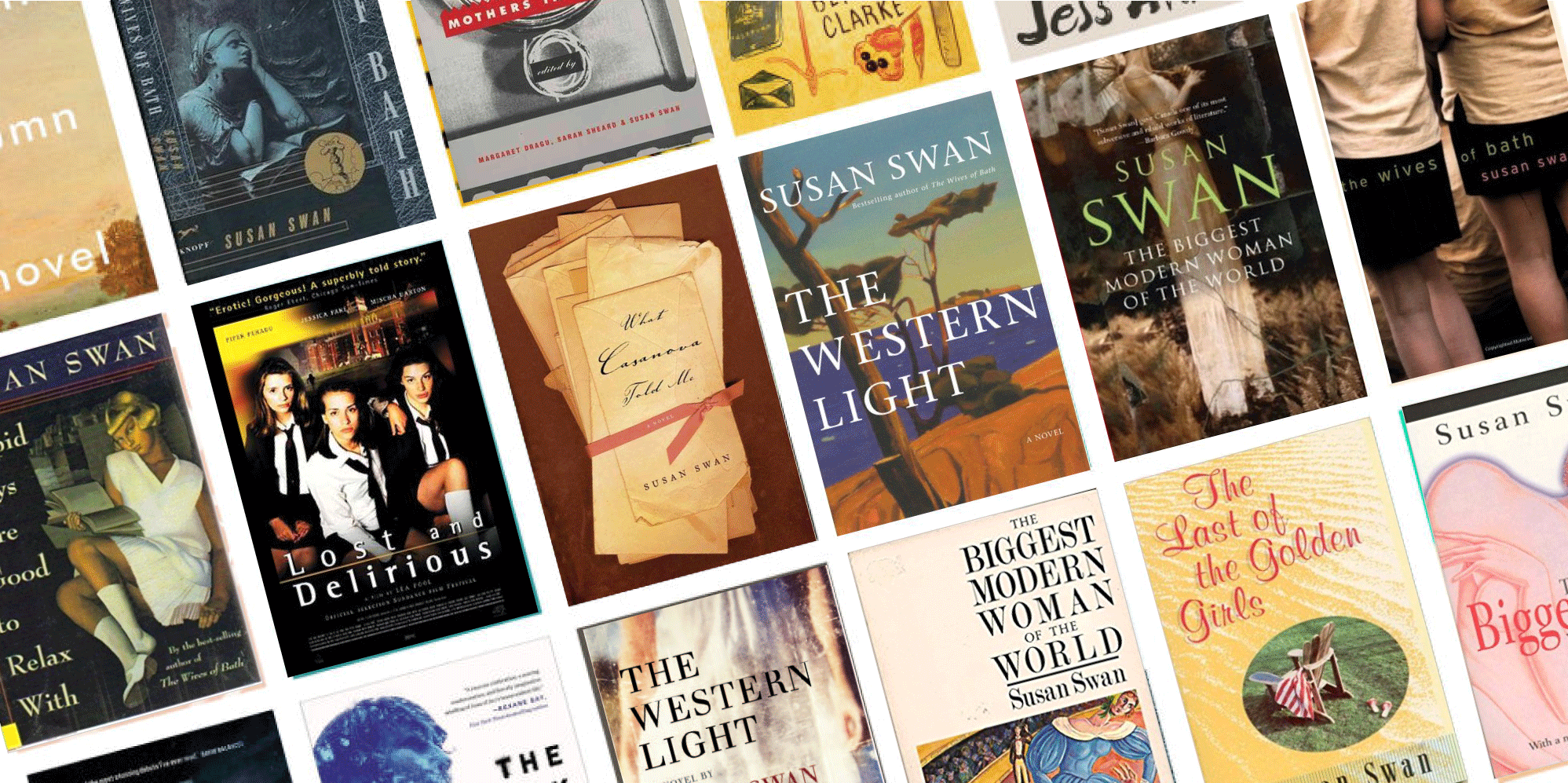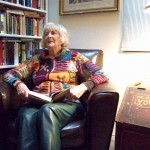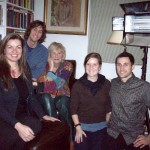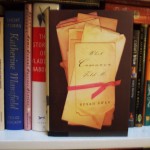Tune in today to listen to Susan live on Spark: CBC Radio One
This week on Spark:
“Literary History of Word Processing, Accelerated Innovation, Education, and Employment”
Catch it live on Sunday January 22 at 1:05 local time. Or listen to the podcast anytime at:
http://www.cbc.ca/spark/2012/01/spark-169-january-22-25-2012/
Podcast day wrapped up on Friday for Book Club Valentine: What Casanova Told Me
Friday was Video Podcast Day. Why? Because I’m finishing a revision of my new novel, The Western Light (publication date: spring of 2013). But just to keep myself busy I’m also doing a book club promotion for Valentine’s Day about my already published historical novel, What Casanova Told Me. And the podcast will be offered to book clubs doing the novel.
My novel which covers two centuries, two women, and a long-lost Journal, is a celebration of love and travel that I hope will incite readers to pack their bags in search of adventure. In the novel are Casanova’s 10 commandments of travel. Number two says:
“Write down what it is you desire and tear your wish into a dozen pieces. Then fling the scraps into a large body of water. (Any ocean will do.)”
One reader asked me if she could throw her wish into Lake Nippissing if the lake was frozen over. In the spirit of Casanova, I said, of course.
Here is a brief look at what else is available in the book club offer:
1. A book club guide to the novel available on Random House website complete with Author Q&A
and discussion questions) for What Casanova Told Me: http://www.bookclubs.ca/catalog/display.pperl?isbn=9780676975772 – Be sure to click on the buttons on the left-hand side, under “Resources.”
2. A fifteen minute podcast from Susan discussing her novel and her fascination with Casanova.
(It will be emailed to your book club leader before your event and can be shared with your members.)*
*That’s what we’re shooting tomorrow. It will be ready to go next week.
3. A twenty-five minute Q and A with Susan and your book club through Skype.
4. Other features such as the song What Casanova Told Me inspired by the novel and writtenby Albertan folk singer Corrie Brewster are available under multimedia on Susan’s blog
www.susanswanonline.com
If your club makes What Casanova Told Me your Valentine, you will receive a free signed copy for a book club
raffle of The Biggest Modern Woman of the World, Swan’s novel about the giantess Anna Swan. Your book
club will also receive a free Bookshort, a short film about What Casanova Told Me on DVD with a short film
inspired by the novel.
Please let us know if this will be your Book Club Valentine this year.
Contact Mariel at whatcasanovatoldme@gmail.com
How to Write with a Cold
I promised myself and some readers and writing students that I would write honestly about revising a novel. This is the background stuff most writers don’t share, like the agony of submissions when your work is submitted to publishers and you and your agent wait to see who will buy your book. (Or if there is even a buyer for your book. Certain agents have recently confided that many good Canadian writers can’t find a publisher these days. But that’s another blog.)
So much of the writing life is a behind the scenes act where a body and a brain put themselves in a chair for x number of hours every day and write. Originally, I made a deal with myself that I needed to be at a desk for four hours every day. I couldn’t re-arrange the book shelves over my desk or phone friends. I had to be at my desk writing, researching what I was writing or thinking about what I was writing. I was strict: I used to sign in and out to make sure I didn’t cheat.
After a while, those four hours, which often stretched into more hours, became part of my day, and I didn’t have to bargain with myself to get that seat on the chair. Just as a guitarist’s fingers will tingle if he or she doesn’t practice when he or she usually practices, a writer like myself starts to feel weirdly out of tune if I spend a day without writing. And of course, I do spend days without writing. But my favourite days are those that start with a writing morning.
This month I am revising my new novel, The Western Light. It’s a prequel to The Wives of Bath, which was about a murder in a girls’ boarding school, and my new book has the same narrator, Mouse Bradford. I’ve been working on The Western Light since 2007 although it was called other names when I started, Black Ships (too vague) and The Hockey Killer (sounds too much like a thriller). Only yesterday, I killed off one of the characters, a boyfriend of Mouse’s aunt, Little Louie, and replaced the old boyfriend with a new boyfriend, a trade union activist named Max Kalkwoski, and now I need to revise about four scenes so that Max emerges in a compelling way.
Will I be able to do this easily? That is, can I simply adapt the old scenes or do I have to come up with new writing? (New writing always requires more thought and time.) And here’s the problem–I’m getting a cold and my mind feels woolly and unfocused. Since ten a.m. I have taken 14 Cold FXs and in another few hours, I will take a dozen more. I have drunk two coffees, three juices and four glasses of water while I read the New York Times and thought long and hard about Max.
That is, I have tried to think about them. But the cold is interfering. It is very much like a character too. It tells me I will never solve the problem, and further more that all efforts are hopeless, and why do I want to write anyway? At first, I argued with the cold and pushed on irritably. But now that I’m writing the blog, I can see the cold is right. FOR THE MOMENT. How to write with a cold is easy: don’t. Go for a nap, or a short walk. Throw out some questions for your unconscious to answer tomorrow, and leave it at that.
Book Club Valentine
Make Casanova Your Book Club Valentine
Are you interested in finding out more about Casanova, the serial seducer and feminist who once famously said: I have never made love to a woman whose language I don’t speak because I like to enjoy myself in all my senses at once.
If you are, make What Casanova Told Me by Canadian author Susan Swan your book club choice for Valentines Day. And Valentines can come early (in January); on time (in February) or later (anytime in the spring). That’s because Susan is offering a special book club package that is being promoted by Random House and includes:
1. A book club guide to the novel available on Random House website complete with Author Q&A
and discussion questions) for What Casanova Told Me (Be sure to click on the buttons on the left-hand side, under “Resources”)
2. A fifteen minute audio file from Susan discussing her novel and her fascination with Casanova. (It will be emailed to your book club leader before your event and can be shared with your members.)
3. A twenty-five minute Q&A with Susan and your book club through Skype.
4. Other features such as the song What Casanova Told Me inspired by the novel and written by Albertan folk singer Corie Brewster are available under multimedia on Susan’s blog.
If your club makes What Casanova Told Me your Valentine, you will receive a free signed copy for a book club raffle of The Biggest Modern Woman of the World, as well as a DVD of the What Casanova Told Me Bookshort, a short film inspired by the novel.
Please let us know if this will be your Book Club Valentine this year.
Contact us at whatcasanovatoldme@gmail.com
You can go home again
I made my first faux pas when I told Midland, Ont., librarian Bill Molesworth that I’d come to town to take the literary temperature in the hinterlands.
“Hinterlands?” His eyebrows shot up. “I’ll try not to hold that against you.”
Molesworth, CEO of the Midland Public Library, is part of IFOA Ontario (or Lit On Tour as it’s also called), which for five years now has been bringing Canadian and international authors to Ontario towns for readings, panels and workshops at the local high schools.
Molesworth was reminding me of what I already knew so well. No matter where you live, your town feels as big as the world. Margaret Laurence once said there was enough fascinating material in her Manitoba hamlet for several lifetimes of book writing. “It never bored me, not ever,” she told an interviewer.
How could I forget? During the 1950s, I grew up in Midland, where Toronto is sometimes disparagingly referred to as The Big Smoke. In those days, former NHL presidents could get away with addressing the crowds as “Ladies, gentlemen and Frenchmen.” Hockey was king and you were on one side or the other. Either you were for ideas and books or you were for hockey.
Are great writers egomaniacs?
Still mulling over a remark about great writers being egomaniacs at the IOFA Ontario discussion I was a part of on Thursday Nov 3 in Midland. Authors Madelaine Thien and Helen Humphreys discussed their recent novels Dogs at the Perimeter and The Reinvention of Love. Respectively.

I’m still thinking about Helen’s claim that great talent often means great ego and a disregard for others. It’s not that a big ego and a big talent come as a package but maybe the big ego and disregard for others helps put the artistic talent forward the way sociopaths are often able to run companies well.
You think?
Helen wrote about Victor Hugo and his wife Adele who had an affair with Hugo’s friend. In Helen’s portrait, based on a lot of historical research, Hugo was an egomaniac. Both novels dealt with secret lives. Thien’s novel is set in Cambodia, Vietnam and Canada and she enthralled the audience with her description of how the Khymer Rouge used to make their prisoners write their biographies over and over again and then they arrested the people mentioned in the biographies.

Photos in this post taken by
Getting ready for the Giller
Canvassing Friends on What to Wear – this is not a rhetorical question
Getting ready for this year’s Giller Prize ceremony I am a bit flummoxed on what to wear.
Should I break with protocol and wear Pat McDonagh’s knock off of a World War One flying suit? The Red Baron, Manfred von Richthofen, wore a suit like this in World War One when he knocked our aircraft out of the sky. He was shot down himself in 1918, the year the war ended.
You get the picture.
But do you get this picture? A case could be made that all writers should dress in combat gear for the Giller since it’s the biggest battle of the books we have in this country.
“An American woman novelist who wrote a book about a family would never be called ‘America’s greatest living writer'” … my recap on Saturday’s IFOA event.

On Saturday, I moderated an International Festival of Authors round table on the family dynamic with three US and Canadian novelists. There were four authors at the round table, including myself: US writer Jennifer Haigh, whose novel Faith describes what happens to the Irish Catholic MGanns when the priest in their family is accused of molesting a child; Canadian Alexi Zentner who wrote Touch, a magic surrealist novel about three generations of a Catholic family in a BC boom to bust frontier town (Touch was recently nominated for a Canadian Governor General’s Award); and Canadian poet and novelist Sina Queryas, who wrote the less traditional but equally compelling, Autobiography of a Childhood. I liked the question asked by a child psychiatrist in the audience. He wanted to know why there seemed to be a new trend of writing about individuals in families instead of novels dealing with individuals and their actualization.
I suggested that Canadians already saw themselves as individuals in a context or group, and maybe there was more of that going around because the world was getting smaller.
Jennifer Haigh said she thought it was because more women were writing novels now and women have traditionally been busy with family. Sina Queryas, who is also a poet, thought it didn’t have so much to do with family but said that there was just more interest in the polyvocal novel–a novel with many voices, which was the case with her novel about a family who is losing a daughter to cancer. Then Alexi Zentner said he agreed with the female writer who complained recently that an American woman novelist who wrote a book about a family would never be called “America’s greatest living writer” (the term applied to Jonathon Franzen). Alexi said it was time it give women writers equal credit for writing about family instead of dismissing their work as domestic novels.
He drew grateful thanks from his female panelists on that one.
Zentner also pointed out that books no longer need wars in them to be considered masterpieces and he was glad that the times have changed. Here are more paraphrased quotes of the day:
When I cross the border, I feel as if a hundred people have stepped off my shoulders. Sina Queryas
Writing around the silence that covers up a family secret is sometimes a necessary digression that distracts you and helps you digest the experience. Sina Queryas.
The duties and obligations of men and women in families aren’t less or more in the case of the genders but just take a different shape. Jennifer Haigh
Death is a good way to examine how we love someone. Alexi Zentner
The family is a bear trap. You can choose to cut off your arm or enjoy the pain. Alexi Zentner
The panelists were all smart and good writers. I found myself lost in the three enthralling but very different worlds of their novels. You can’t beat that for a recommendation, can you?
More thoughts and articles on refugee journalists…
I can’t seem to shake the chills thinking about the horrific experience of refugee Eritrean journalist Aaron Berhane. There are so many more like him still in jail, held unjustly by their governments.
As I mentioned in my blog on Aaron, I wrote a letter to Dawit Habtemichael, another Eritrean journalist being held by the Eritrean government unlawfully. I am working with PEN, essentially ‘adopting’ Dawit and helping to fight for his release. The links below will take you to PEN Canada’s website where there is video footage of each letter, written by the five authors although Marion Botsford Fraser read my letter that day because guess what––I had the flu. These letters were read at a September 23 event called, “The Other Side of Silence – Speaking out for Eritrea’s Imprisoned Journalists.”
International Festival of Authors – Roundtable: The Family Dynamic
As part of the IFOA, I am delighted to be hosting a panel discussion with Canadian & US novelists writing about family myths and secrets: Alexi Zentner, Jennifer Haigh and Sina Queyras.
All this information can also be found on my Facebook page(s).










